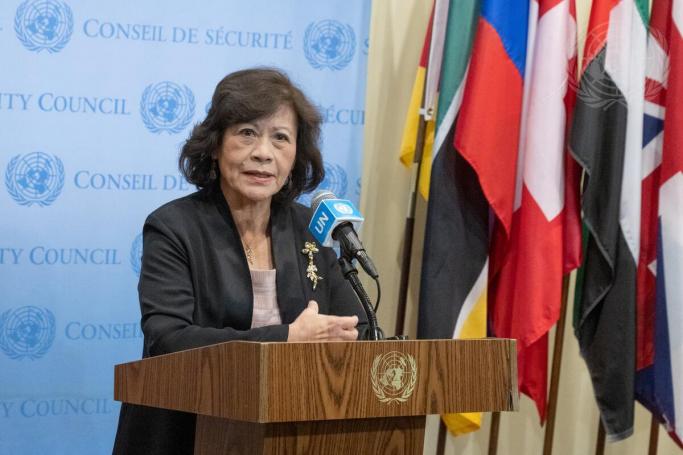The UN Special Envoy for the Secretary General on Myanmar Ms. Noeleen Heyzer appears to be saddled with Mission Impossible, judging by her own words. As she told the UN Security Council last week: “With both sides intent on prevailing by force, there is no prospect for a negotiated settlement.”
A lot now sits on this 74-year-old Singaporean’s shoulders. Since she was appointed in October 2021, Ms. Heyzer claims to have met a lot of the main players involved in the Myanmar crisis, including a visit to the Myanmar military junta in Naypyitaw, members of the opposition National Unity Government (NUG), ethnic armed organizations (EAOs), and humanitarian organizations, and has trudged through the dusty lanes of the Rohingya refugee camps in Bangladesh.
The last 18 months have been a struggle, dogged by controversy, her Naypyitaw visit depicted as pandering to the generals. A Channel News Asia interview prompted anger over the suggestion she was proposing a “power-sharing” agreement with the generals. She had to issue a statement saying there was a misunderstanding. And more recently, civil society groups, and women’s groups in particular, have said they need the UN Special Envoy’s ear.
Ms. Heyzer says her mission is to listen and it is clear that to some extent she has to tip-toe amidst the sensitivities that beset such a complicated country as Myanmar and the dire crisis. While UN Special Rapporteur for human rights in Myanmar Tom Andrews often comes out with angry rhetoric against the Myanmar junta, Ms. Heyzer tends to be more measured with her words of condemnation. But last week it was hard for her in her speech to the UN General Assembly to sugar-coat just how dire things are in Myanmar and where the blame lies.
The Myanmar generals and the NUG are at loggerheads. And that puts the UN Special Envoy in a tricky situation.
While she says she has no immediate plans to go back to Naypyitaw to visit the generals, it is clear she needs to engage more with the Spring Revolution players and the humanitarian groups. In large part this is because the humanitarian aid situation is so dire, and the practicality of delivering aid to the recipients problematic. While she has demonstrated a keen interest in the fate of Rohingya refugees, and visited the Bangladesh camps to hear their stories, controversy swirls around UN plans
to repatriate the refugees to Rakhine State while the situation on the ground needs serious improvement.
As the stalemate ensues, Ms. Heyzer would be wise to focus her work on public interest groups such as Civil Society Organisations and particularly the young emerging leaders from Myanmar’s myriad societies and communities as such engagement would help their future and the future of the country as a whole.
Last week, two high-profile Burmese women’s group activists invited to the UN by Norway’s representative to give a presentation made an open call to meet with the UN Special Envoy to discuss their group’s concerns.
The dire situation in Myanmar reinforces that old saying – it is easier to make war than to make peace.
But while the situation looks like Mission Impossible, the UN Special Envoy needs to make every effort to engage with a wide range of key Myanmar players to help bring real positive change to the Golden Land.












